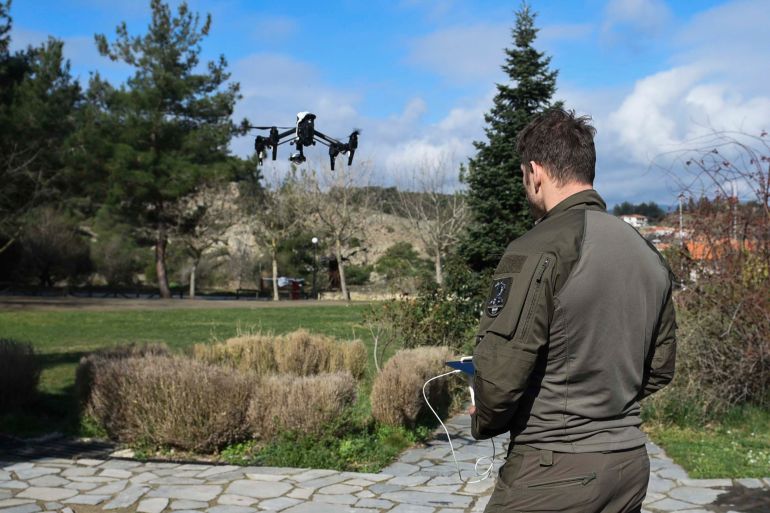Ban racist and lethal AI from Europe’s borders
Today, European lawmakers are facing a once-in-a-lifetime opportunity to make sure AI technologies are used to protect, not surveil.

The European Union is in the final stages of crafting first-of-its-kind legislation to regulate harmful uses of artificial intelligence. However, as it currently stands, the proposed law, called the EU AI Act, contains a lethal blind spot: It does not ban the many harmful and dangerous uses of AI systems in the context of immigration enforcement.
We, a coalition of human rights organisations, call on EU lawmakers to make sure that this landmark legislation protects everyone, including asylum seekers and others on the move at Europe’s borders from dangerous and racist surveillance technologies. We call on them to ensure AI technologies are used to #ProtectNotSurveil.
Keep reading
list of 4 itemsGeorgia’s ‘foreign agents’ bill: What’s the controversy about? What’s next?
What’s at stake in next month’s European elections?
EU to drop rule-of-law dispute with Poland
AI makes borders deadlier
Europe’s borders are becoming deadlier with each passing day. Data-intensive technologies, including artificial intelligence systems, are increasingly being used to make Fortress Europe impenetrable. Border and policing authorities are employing predictive analytics, risk assessments through colossal interoperable biometrics databases, and AI-augmented drones to surveil people on the move and push them away from the EU’s borders. For example, the European border agency Frontex, which stands accused of being complicit in grave human rights violations at many EU borders, is known to use various AI-powered technological systems to facilitate violent and illegal pushback operations.
From lie detectors to drones and other AI-powered systems, border surveillance tools are proven to push people towards more precarious and deadly routes, strip them of their fundamental privacy rights and unjustifiably prejudice their claims to immigration status. These technologies are also known to criminalise and racially profile people on the move and facilitate unlawful deportations that are in violation of humanitarian protection principles.
The EU AI Act can resist the oppressive use of tech
At a time when EU member states are racing to craft anti-migration policies in an affront to their domestic and international legal obligations, limiting and regulating the use of artificial intelligence in migration control is crucial to prevent harm.
It’s also an unmissable opportunity to prevent the accumulation of deadly, inhumane powers in the hands of authoritarian governments – both in the EU and in states where the EU seeks to externalise its borders.
The EU AI Act can provide key red lines and accountability mechanisms to help protect the fundamental rights of people subjected to AI systems in the migration control context. As outlined in our proposed amendments to the AI Act, these could include bans on the use of racist algorithms and predictive analytics to label people as “threats” as well as dubious AI-based “lie detectors” and other emotion recognition tools to unlawfully push people away from borders. The EU has long been working towards protecting its citizens from biometric mass surveillance and such protections are expected to be part of the final EU AI Act. These efforts should not discriminate based on nationality and racialised ideas of risk and should be expanded to include all people in Europe
Power to the people, not to the private sector
We also fear that leaving the use of AI in migration control up to EU member states will lead to a global race towards more intrusive technologies to prevent or deter migration – technologies that would fundamentally change or, at worst, end the lives of real people.
If the EU AI Act fails to regularise and limit the use of AI technologies in migration enforcement, private actors will be quick to exploit the loophole to forcefully push new products. They will send their products to our borders without proper checks, just as uses that will fall within the scope of the AI Act become subject to more stringent regulation and barriers to entry.
This is a lucrative multibillion-dollar industry. Frontex spent 434 million euros ($476m) on military-grade surveillance and IT infrastructure from 2014 to 2020. Technologies will be deployed and trained at the expense of people’s fundamental rights and later repurposed in other contexts beyond migration control, evading crucial scrutiny at the design stage.
We have already seen private actors – such as Palantir, G4S and the lesser-known Buddi Ltd – take advantage of governments’ desire for more surveillance to sell tech that facilitates inhumane practices at borders and violations of the fundamental rights of people on the move.
There is still time for the EU to do the right thing: make sure that unacceptable uses of AI in the migration context are banned and all loopholes are closed, so EU standards on privacy and other fundamental rights apply equally to all.
Signatories
Lucie Audibert, lawyer, Privacy International
Hope Barker, senior policy analyst, Border Violence Monitoring Network
Mher Hakobyan, advocacy adviser on AI regulation, Amnesty International
Petra Molnar, associate director, Refugee Law Lab, York University; fellow, Harvard Law School
Derya Ozkul, senior research fellow, University of Oxford
Caterina Rodelli, EU policy analyst, Access Now
Alyna Smith, Platform for International Cooperation on Undocumented Migrants
The views expressed in this article are the authors’ own and do not necessarily reflect Al Jazeera’s editorial stance.
